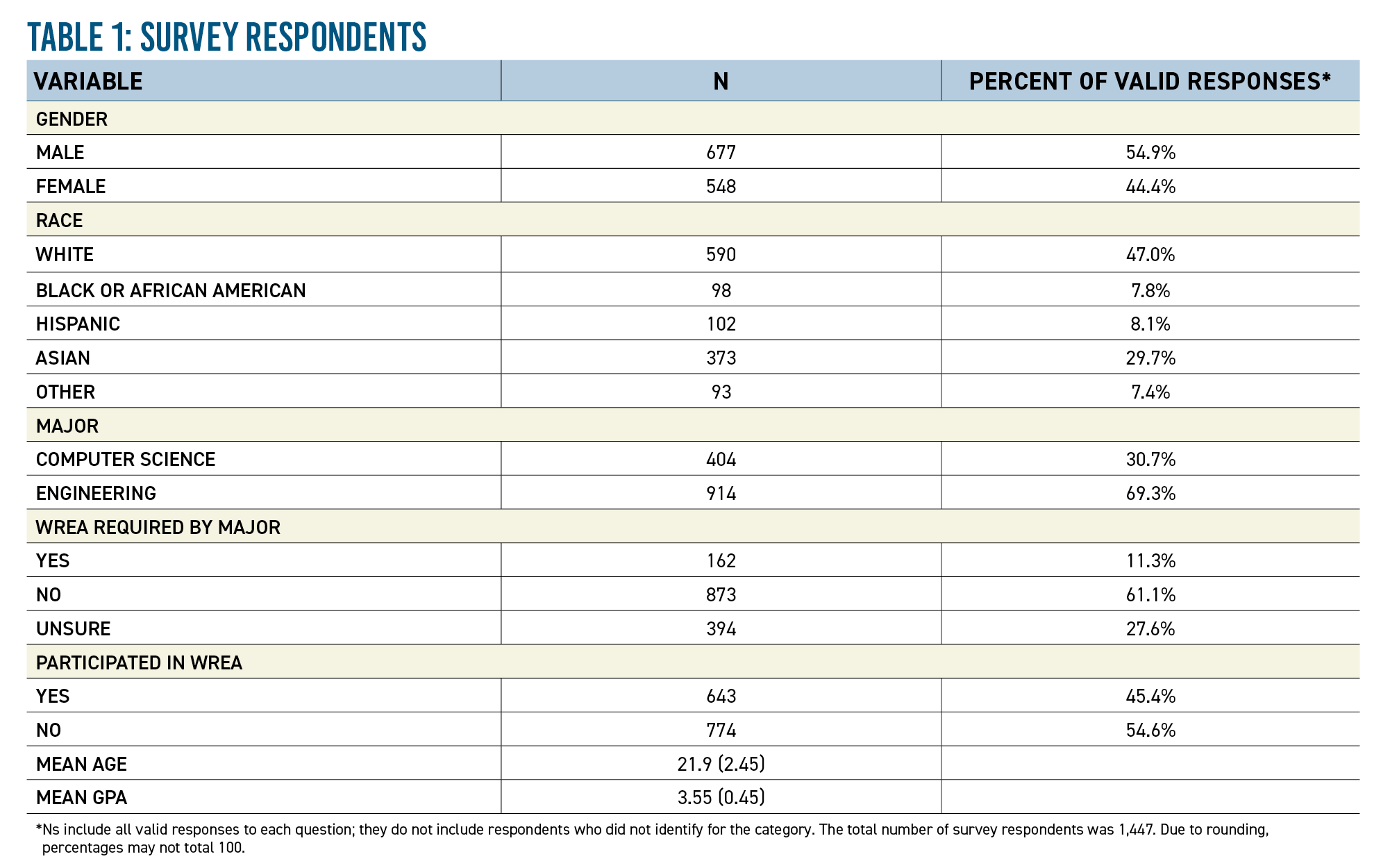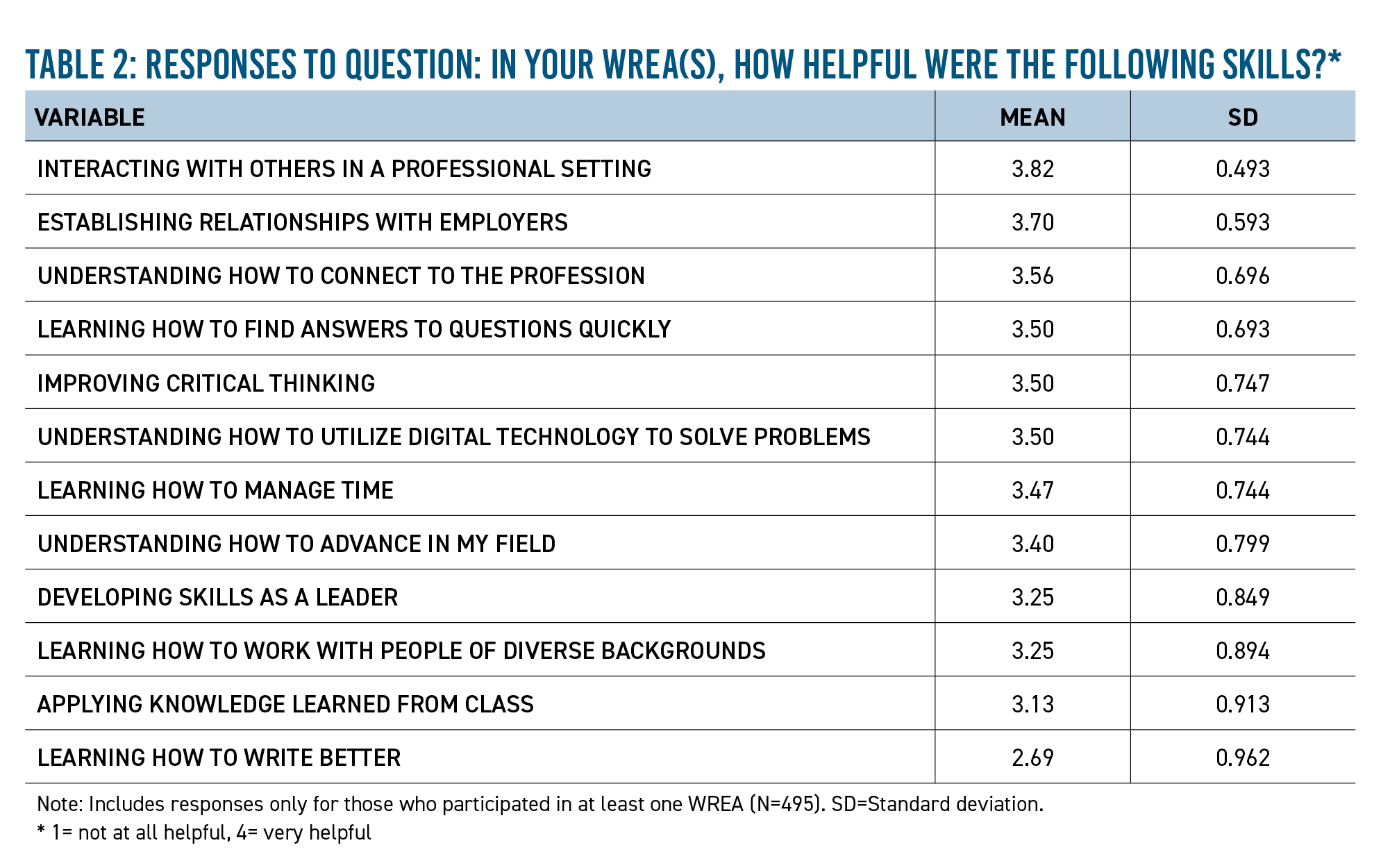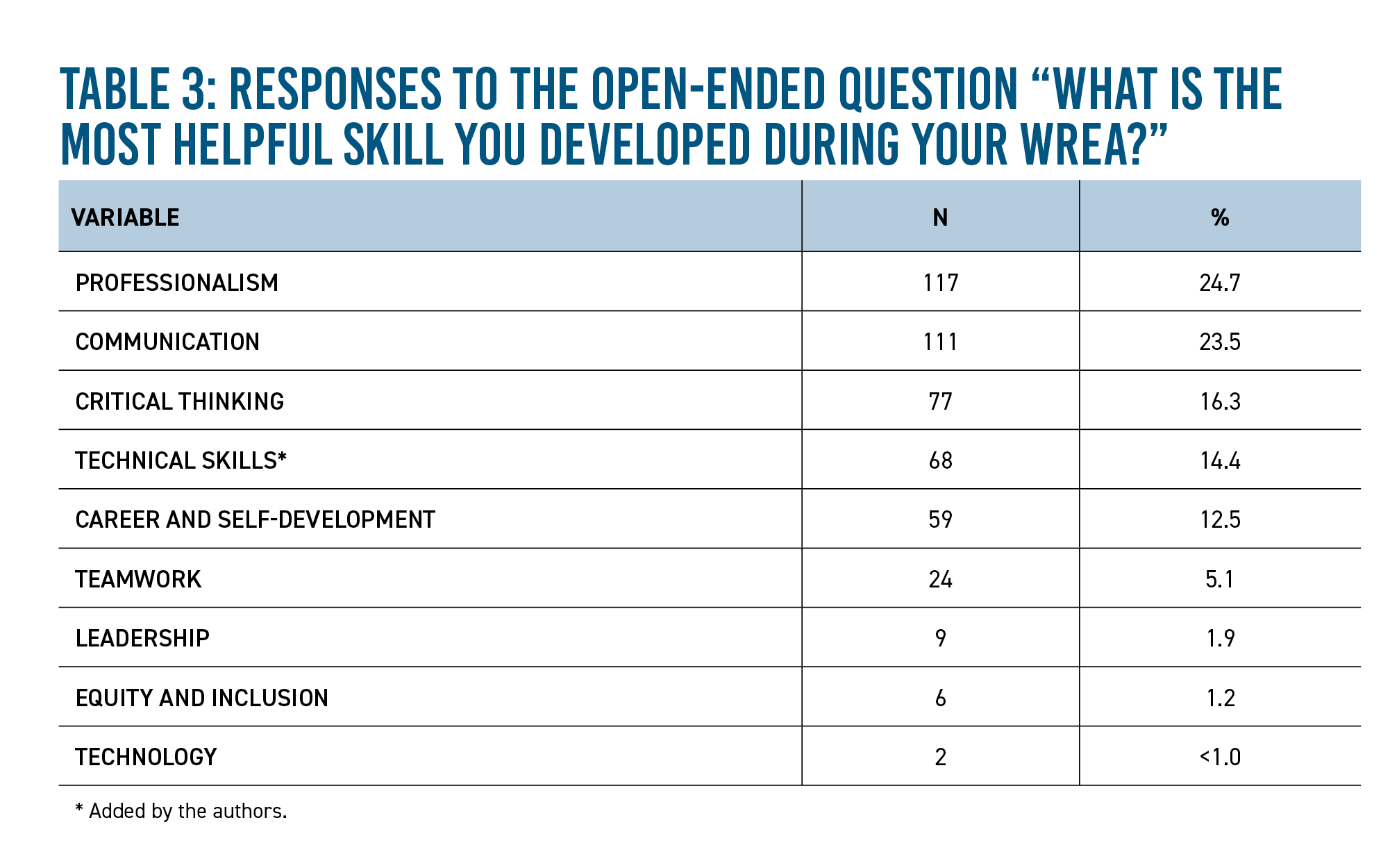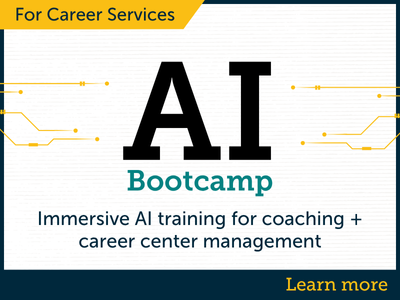NACE Journal / Fall 2022
Science, technology, engineering, and mathematics (STEM) fields have become increasingly important to the U.S. economy, and many states have identified these fields as critical for economic competitiveness.1, 2, 3 Employers are challenged to find workers with the appropriate hard—technical—and soft skills, e.g., oral and written communications.4, 5 Work-related experiential activities (WREAs), such as internships, job shadows, or cooperative education experiences (co-ops), have been suggested as one tool to support students in developing the kinds of skills needed for employment.
Acquisition of professional knowledge as well as technical and communication skills are essential to successful employment offers, and NACE’s career readiness competencies provide a helpful understanding of the ideas related to career readiness, employability, and life careers.6 According to NACE, career readiness is “a foundation from which to demonstrate requisite core competencies that broadly prepare the college educated for success in the workplace and lifelong career management.” The competencies—career and self-development, communication, critical thinking, equity and inclusion, leadership, professionalism, teamwork, and technology—provide a helpful framework to address career-related goals and outcomes and are relevant across all disciplines. From the lens of social cognitive career theory (SCCT), WREAs offer an ideal opportunity to combine interests and experiences that can influence one’s career interests, attitudes, and preferences. Similar to Kolb’s theory on experiential learning, which emphasizes active participation, SCCT purports that aspirations and career choices result from the complex interplay of person, environment, and behavior.7 Work-related experiences build the connections between knowledge, skills, work tasks, and possible career fit. These connections also help students choose WREA activities and formulate education goals. For employers, career readiness offers an important way to determine a prospective employee’s talent by seeing one’s knowledge and skills that exist across multiple job functions. Further, the principles of career readiness offer a framework for identifying skills that are developed or enhanced through work-related experiential activities.
There is ample evidence that WREAs are associated with positive gains for students in academic achievement and career learning, and there is a greater likelihood of employment. Despite their benefits, not all students are able to participate in WREA activities due to financial, sociocultural, or institutional barriers.8 Further, the COVID-19 pandemic has prompted changes in students’ access to experiential education activities, often critical to their successful acquisition of employment after graduation. In 2020-21 and continuing today, more WREA activities are offered remotely, often with students completing their WREA tasks online.
Collectively, these changes urge additional study to better understand the current role of career competencies in postsecondary education and how they assist students in their transition to employment. In this article, we seek to add to the discussion around career competency skills in the critical STEM fields of engineering and computer science and to deepen our understanding of WREAs in helping students gain those skills. Further study of students’ perceptions of their WREA experiences in this tumultuous period of social and economic change can greatly assist employers and career practitioners in offering activities that improve the college completion and a successful transition to post-graduation employment.
Work-Related Experiential Activities
Much of the literature guiding our work draws primarily on research related to internships and cooperative education activities (co-ops) for college students, but other activities, such as job shadows, offer students ways to become better prepared for full-time work.
While many traditional work-related activities exist and remain robust, the COVID-19 pandemic increased the number or remote and hybrid opportunities. WREAs offered via remote and hybrid modalities should, in theory, offer similar opportunities to enhance the same set of skills and abilities. The increase in nontraditional WREA modalities may contribute in novel ways to benefit students, and our post-pandemic world offers another reason to further explore students’ perceptions of career competencies and those that are enhanced through their WREA experiences.
Engagement in WREAs helps students learn about the workplace, make academic gains, and increase their employability.9 Many factors may influence the value of internships in developing these positive gains, including pay status, employment offers, skills refinement, and appreciation of mentorship.10 Similar to internships, co-ops offer opportunities for personal growth in work competencies, skills, sense of self, and employability.
Overall, improved employability from work-related experiences is enhanced by the development of workplace skills, networking, and/or signaling of career readiness. WREAs are perceived by employers and students to help provide relevant experience and develop job-specific and transferrable skills if the internship host does not hire the student.11, 12, 13 Skills have mainly been commodified into discrete attributes that one does or does not possess and whose development is an individual responsibility, critical toward their employability and larger economic development.14
Intentional meetings as well as unplanned interactions—such as conversations at the water cooler—can help the WREA student meet new people and access the social networks that entrance into an organization can provide.15 Interns see the experience as a way to make connections and as a resume item.16, 17 This latter idea of the internship as a resume item is important. Internships refine students’ skills and enhance one’s resume, which can signal their skills to potential employers—or provide a cultural signal. A resume-audit study in business found that having industry-relevant internship experiences during college significantly raised the interview rate of job applicants (14% higher than non-interns).18 Additionally, industry-relevant internship experiences were especially beneficial for non-business degree holders. These authors suggested that signaling likely explains their findings.
Especially in light of the non-linear career path for today’s worker, an understanding of the relationship between possession of competencies and career success is important.19 Ample previous literature provides information on the role of competency development and career success, including studies that found employee participation in competency development was positively associated with perceived employability.20, 21 Perhaps when individuals are aware of their own abilities, they can choose work-related positions that are a better fit. This is borne out in one study, which found that career competencies enabled young workers to more astutely construct their jobs which, in turn, related to career success.22
Gauging Students’ Experiences With and Perceptions of WREAs
As part of a larger grant-funded project to examine the transition between college and the workforce, a career and employment survey was developed, pilot tested, and administered in spring 2021 via Qualtrics to gauge students’ experiences and perceptions of WREAs.23 The survey was emailed to all juniors and seniors majoring in computer science and engineering at five universities in one southeastern U.S. state, all having long-standing STEM programs.
Aligning closely with the NACE career competencies, and the focus of this article, a series of 13 Likert-scaled items asked, “For the WREAs you participated in, how helpful were the following activities? (1= not helpful at all, 4= very helpful).” To further probe respondents’ perceptions of their WREA experiences, three survey questions provided open-ended responses. Open-ended questions asked about the most helpful skill developed, the least helpful experience, and recommendations to improve WREAs for students in the future. In our analysis herein, we report only on the first open-ended question, which asked, “What is the most helpful skill you developed during your WREA(s)?”
The survey was distributed to 10,503 junior and senior computer science and engineering students at the five universities, and overall, we received usable responses from 1,447 students for a total response rate of 13.8%.
Following a thorough review of the data, descriptive statistics were completed to examine respondents’ perceptions of useful skills gained from WREA participation. Select demographic characteristics for survey respondents are included in Table 1. As shown, 55% of the respondents were male and about half were students of color. About 45% said they had participated in at least one WREA even though 61% said it was not required for their academic program. Following review of descriptive analyses, we employed independent two-sample T-tests to examine relevant survey items by select demographic characteristics.
We sought to further probe student experiences during their WREAs through the open-ended questions.24

Findings: Students and WREAs
Overall, students described the most helpful skills during their WREAs as relating to their exposure to real-world experience: interacting in a professional setting; establishing relationships with employers; and understanding how to connect to others in the profession. Interestingly, the application of classroom knowledge and writing skills were indicated as helpful skills the least often. (See Table 2.)

Responses to the career competency items were also examined by several important demographic characteristics, including gender, race/ethnicity, financial aid status, and major, with relatively few significant differences revealed overall. Of particular interest, computer science majors and engineering majors indicated a similar level of help with time management, the application of knowledge, professional interactions, writing skills, mentorship, critical thinking, using digital technologies to solve problems, advancing in the field, and learning how to work with diverse groups of people. However, there were statistically significant differences between the majors in a few key skill areas:
- Compared with men, women said their WREA experience was more helpful in working with people from diverse backgrounds, writing, and in learning how to find answers quickly;
- Compared with peers in computer science, respondents from engineering said their WREAs were more helpful in leadership skill development, establishing relationships with employers, and in connection to others in the profession; and
- Compared with engineering major peers, respondents in computer science said their WREAs were helpful in finding answers quickly.
Students were also asked an open-ended question regarding their perceptions of the skill they developed through their WREA participation. Table 3 shows the number and percentage of responses aligned with each NACE competency (and our additional category of Technical Skills). From the inductive coding procedure described above, the two most frequent skills helped by WREA participation were Professionalism and Communication.

As shown in Table 3, the largest number of comments related to Professionalism. In answering the question of the most important skills developed,one engineering student cited “the overall experience of working in a professional environment/understanding how full-time jobs are different from being a student.” Related to time management, a number of students said they gained skills in “time management for completing multiple tasks at once and finishing all of them before their respective deadlines.”
Our analysis of Communication behaviors included actions whereby students communicated their needs for more information or let supervisors know they were stuck. Some responses included a broad understanding of oral and written communication or technical writing, but some were specific to “gaining presentation skills to expert and non-expert audiences.”
The category of Critical Thinking included broad critical thinking, application of classwork, and problem solving. One engineering student identified “learning to solve problems/answer questions on my own, mainly via reading technical/engineering documents” as most important, while another engineering student said, “I learned how to connect what I learned in class with what I would actually be expected to do in the field.” Other responses included things such as using data to drive decisions and adapting to multiple roles.”
Within our added category—Technical Skills—we included anything specific to the line of work or is niche to the field. This might include computer coding for a computer science student or learning to use CAD (computer-aided design software) for engineering students. A response from a computer science major provides some detail on the importance and utility of technical skills: “I’m a computer science major, so hard skills, such as specific coding languages, were the most helpful skills I developed. I was able to market the fact that I had experience with more languages after each internship.”
Discussion and Implications for Practitioners
Career readiness is the foundation for college students’ demonstration of requisite core knowledge and skills that set the stage for success in the workplace and lifelong career management, and the NACE career competencies provide a great way to understand and implement ideas related to knowledge gained, skills acquired, and employability.
Findings from our spring 2021 survey show that many students experience the positive value of work-related activities.25 Survey items that mirrored the NACE competencies showed that the most helpful skills that were developed during their WREA were Professionalism and Communication (each mentioned by approximately 25% of the respondents). Only a small percentage of students said they developed (or further developed) their skills in Teamwork, Technology, Equity & Inclusion,and Leadership. Because many WREAs were offered remotely, it is quite possible that respondents experienced a somewhat different set of tasks that minimized opportunities related to these skills. In line with Kolb’s theory on experiential learning, officials may wish to consider that interplay of the person, environment, and behavior that have an impact on career choice.26
To improve WREA experiences, career services professionals may wish to collaborate with industry officials to consider ways to structure activities that provide the application of knowledge in the work setting, perhaps suggest activities, and help manage students’ expectations about their WREA experience. In addition, employers should ensure that supervisors offer feedback, mentorship, and guidance on how to appreciate the benefits of working with a diversity of peers. For WREAs that remain remote, greater attention may need to be given to building teamwork. If more WREA activities return to an in-person experience, career services professionals may wish to help industry partners plan activities that address career readiness competencies such as teamwork and feeling confident to ask for clarification when needed. While professionalism and communication are extremely important, long-term career success may be more likely when students as new employees engage proficiently in team-based activities and in a work environment that includes principles of equity and inclusion in its policies and daily practices.
Additional research on students’ experiences with career competencies is needed because experiential activities may differ by site, supervisor, location, or focused activity. Different models (length of the internship and paid vs. unpaid) and modes (remote vs. in-person) of internships across industries can further explore how and where students obtain the benefits of internships. These improved structures could incorporate a more complex view of employability and reinforce the notion of a comprehensive and integrated set of skills, rather than simply acquiring disparate aptitudes. In this report, we focus on career readiness skills and their development toward fruitful employment, however, we know that focusing only on skills development for employability overlooks substantial barriers, such as cultural and social capital differences, that are often outside of the control of students as they seek post-graduate employment.27 More research can help tease out these important nuances.
To ensure that internships have the desired outcomes, discussions between students, employers, and universities to outline structures and successful characteristics will provide greater benefit to interns.28 To reach this desired goal, interns should align their work with employer expectations, demonstrate desirable qualities, seek mentorship and opportunities, and journal their WREA to reflect on the experience. Faculty and career center professionals can assist in bridging the connections between knowledge gained in classroom and application in the work setting. Further, employers should provide supervisors who can give detailed guidance and feedback and plan for intern success. All of these actions will help build meaningful connections between the WREA experience and a successful transition into the workforce.
Endnotes
1 National Academies of Science, Engineering, and Medicine. (2021). Call to action for science education: Building opportunity for the future. The National Academies Press. https://doi.org/10.17226/26152.
2 Fact sheet: Biden-Harris administration actions to attract STEM talent and strengthen our economy and competitiveness. (2022, January 21). Whitehouse.Gov. Retrieved from https://www.whitehouse.gov/briefing-room/statements-releases/2022/01/21/fact-sheet-biden-harris-administration-actions-to-attract-stem-talent-and-strengthen-our-economy-and-competitiveness/.
3 HDCI Report. (2014). Governor’s high demand career initiative report. Retrieved from https://tcsg.edu/wp-content/uploads/2018/07/HDCI-Report.pdf.
4 Alper, J. (2016). Developing a national STEM workforce strategy: A workshop summary. In Developing a National STEM Workforce Strategy. The National Academies Press. https://doi.org/10.17226/21900.
5 Hora, M. T., Benbow, R. J., & Oleson, A. K. (2016). Beyond the skills gap: Preparing college students for life and work. Harvard Education Press.
6 National Assocation of Colleges and Employers. (n.d.) What is career readiness? Retrieved from www.naceweb.org/career-readiness/competencies/career-readiness-defined.
7 Lent, R. W., Brown, S. D., & Hackett, G. (2000). Contextual supports and barriers to career choice: A social cognitive analysis. Journal of Counseling Psychology, 47(1), 36.
8 Hora, M. T., Wolfgram, M., & Chen, Z. (2019). Closing the doors of opportunity: How financial, sociocultural, and institutional barriers intersect to inhibit participation in college internships (WCER Working Paper No. 2019‐8). Wisconsin Center for Education Research. http://www.wcer.wisc.edu/publications/working-papers.
9 Hora, M. T., Wolfgram, M., & Thompson, S. (2017). What do we know about the impact of internships on student outcomes? (Research Brief #2). Center for Research on College-Workforce Transitions. http://ccwt.wceruw.org/documents/CCWT-report-Designing-Internship-Programs.pdf.
10 Hora, M. T., Chen, Z., Parrott, E., & Her, P. (2020). Problematizing college internships: Exploring issues with access, program design and developmental outcomes. International Journal of Work-Integrated Learning, 21(3), 235–252.
11 Chen, Z., Hora, M. T., Dueñas, M., Chen, Z., & Wolfgram, M. (2020). Results from the college internship study at a Texas College. Center for Research on College-Workforce Transitions. https://ccwt.wisc.edu/wp-content/uploads/2022/04/CCWT_report_results-from-Texas-University.pdf.
12 Frenette, A., Dumford, A. D., Miller, A. L., & Tepper, S. J. (2015). The internship divide: The promise and challenges of internships in the arts. In Strategic National Arts Alumni Project.
13 Knouse, S. B., Tanner, J. R., & Harris, E. W. (1999). The relation of college internships,
college performance, and subsequent job opportunity. Journal of Employment Counseling, 36(1), 35–43. https://doi.org/10.1002/j.2161-1920.1999.tb01007.x.
14 Hora, M. T., Newman, R. Y., Hemp, R., Brandon, J., & Wu, Y. J. (2020). Reframing student employability: From commodifying the self to supporting student, worker, and societal well-being. Change: The Magazine of Higher Learning, 52(1), 37–45. https://doi.org/10.1080/00091383.2020.1693839.
15 Gault, J., Leach, E., & Duey, M. (2010). Effects of business internships on job marketability: The employers’ perspective. Education and Training, 52(1), 76–88. https://doi.org/10.1108/00400911011017690.
16 Frenette, A. (2013). Making the intern economy: Role and career challenges of the music industry intern. Work and Occupations, 40(4), 364–397. https://doi.org/10.1177/0730888413504098.
17 Hora, M. T., Parrott, E., & Her, P. (2020). How do students conceptualise the college internship experience? Towards a student-centred approach to designing and implementing internships. Journal of Education and Work, 33(1), 48–66. https://doi.org/10.1080/13639080.2019.1708869.
18 Nunley, J. M., Pugh, A., Romero, N., & Seals Jr., R. A. (2016). College major, internship experience, and employment opportunities: Estimates from a resume audit. Labour Economics, 38, 37–46. https://doi.org/10.1016/j.labeco.2015.11.002.
19 Eby, L. Butts, M., & Lockwood, A. (2003). Predictors of success in the era of the boundaryless career. Journal of Organizational Behavior, 24, 689-708.
20 Blokker, R., Akkermans, J., Tims, M., Jansen, P., & Khapova, S.N. (2019). Building a sustainable start: The role of career competencies, career success, and career shocks in young professionals’ employability. Journal of Vocational Behavior, 112, 172-184.
21 De Vos, A., De Hauw, S., & Van der Heijden, B. (2011) Comptency development and career success: The mediating role of employability. Journal of Vocational Behavior, 79, 438-447.
22 Akkermans, J., & Tims, M. (2017). Crafting your career: How career competencies relate to career success via job crafting. Applied Psychology, 66(1), 168-195. https://doi.org/10.1111/apps.12082.
23 The project is supported by NSF Grant #2000847. Findings, opinions, or recommendations expressed are those of the authors and do not necessarily reflect the views of the NSF.
24 Using an iterative coding process, two researchers independently and inductively analyzed 25% of the responses for each of the three questions, creating primary and secondary codes. Mindful of the NACE career readiness competencies framework, the researchers then met to review, create, and define a series of codes used for the remaining responses to ensure coder agreement. If a student listed more than one skill in their response, each skill was coded individually. In addition to codes that reflected the competencies, we added a code for Technical Skills for those items which were highly specific, e.g., machine learning.
25 Note that the findings are limited in several ways. First, although the comparison of weighted and unweighted results yielded no significant differences in the findings, a low response rate at two of the survey sites caution generalizability of the results. Second, the survey did not ask about the gains students made in specific skills, only if they were helpful in their WREA. It is likely that many respondents conflated these two constructs, but we can’t be certain. While these limitations suggest caution, we believe these data are useful in conceptualizing the skills students believe are valuable in WREAs and perceptions of the skills they gained through their WREA participation.
26 Kolb, D.A. (2015) Experiential Learning: Experience as a source of learning and development. Pearson Education, Ltd.
27 Hora, M. T. (2018). Hiring as cultural gatekeeping into occupational communities: Implications for college students, faculty, and career advisors (WCER Working Paper 2018-1). Wisconsin Center for Education Research. http://www.wcer.wisc.edu/publications/working-papers.
28 Maertz, C. P., Stoeberl, P. A., & Marks, J. (2014). Building successful internships: Lessons from the research for interns, schools, and employers. Career Development International, 19(1), 123–142. https://doi.org/10.1108/CDI-03-2013-0025.






